Webinars
All webinars are conducted in English and are generally open to the public unless specified otherwise.
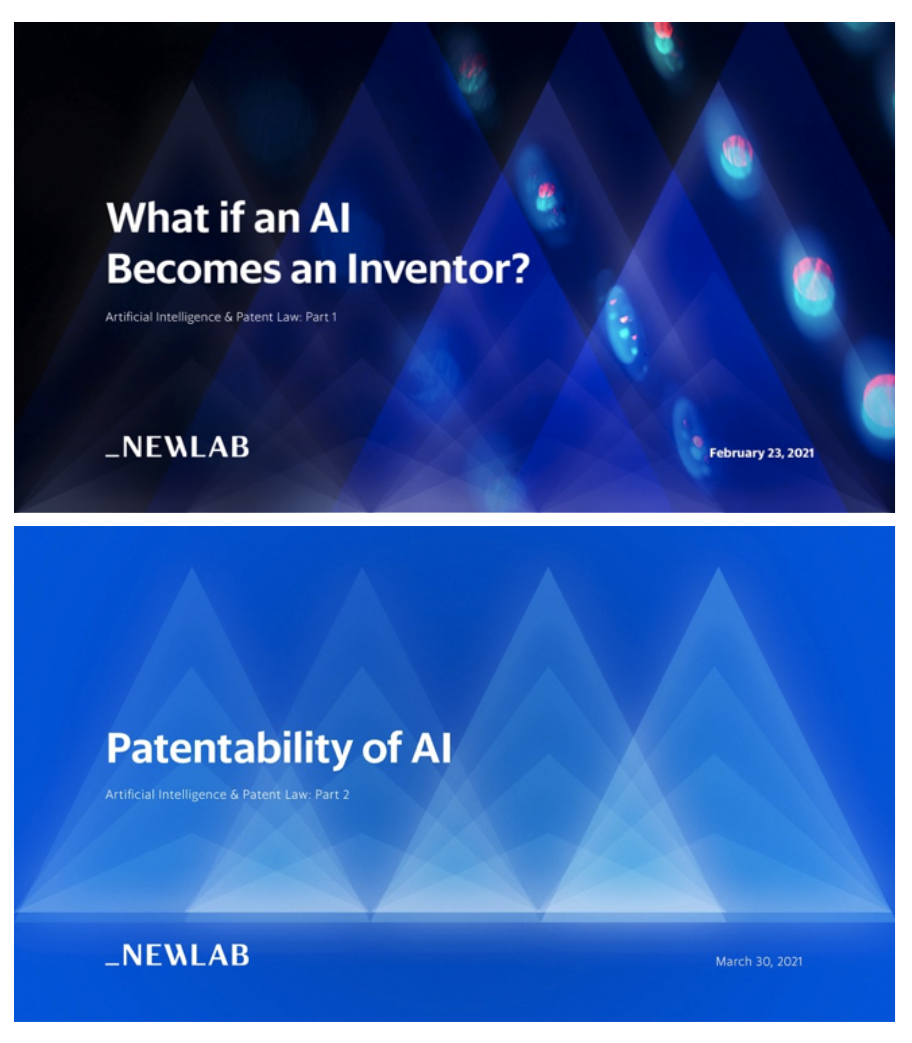
Artificial Intelligence & Patent Law
The rapid advancement of artificial intelligence is driving technological innovation, disrupting industries, and sparking important questions in economics, law, and ethics. In this webinar series, we will explore the intersection of patent law and AI technology, examining the role patent law plays in the development of AI and how AI is transforming the practice of patent law itself.
- Hosted by Newlab
- Start: Tuesday, February 23, 2021 12:00 PM EST / 9:00 AM PST
- End: Tuesday, March 30, 2021 1:00 PM EDT / 10:00 AM PDT
Date
Tuesday, February 23, 2021 12:00 PM EST / 9:00 AM PST
Topic
What If AI Becomes an Inventor?
Description
In this session, we will delve into questions surrounding how the rise of AI may impact patent practice. For instance:
- Can AI be recognized as an inventor?
- What if AI is used as a research tool by a human inventor?
- Who owns the inventions generated by AI—the creator of the AI or its user?
- How might AI influence the “person having ordinary skill in the art” standard in relation to enablement and non-obviousness requirements?
Tuesday, March 30, 2021 12:00 PM EDT / 9:00 AM PDT
Patentability of AI
In this session, we will examine key questions about the current state of the law regarding the patentability of AI technology. Topics will include:
- What types of AI tools are eligible for patent protection?
- How is patentability affected when AI is incidental to another invention, such as a custom-designed AI contributing to innovations in chemistry?
- What are the best practices for drafting patent applications and claims focused on AI technology?
Join us as we navigate the complexities of patenting AI innovations and explore practical strategies for success.
Passcode: Newlab2021
U.S. Patent Strategy for Entrepreneurs: Licensing & Business Considerations
Startups often wonder how they can generate revenue from their patents. This webinar will explore the legal framework governing U.S. patent licensing agreements and the critical connection between patent portfolios and company valuation.
We’ll discuss key factors for negotiating favorable licensing deals and examine how patents can enhance a business’s appeal to investors. Questions we’ll address include:
- What aspects of a patent licensing agreement require close attention, and what are the defaults if the agreement is silent on those points?
- Can a licensee enforce a patent against infringers if the patent owner declines to act?
- If a patent is later deemed invalid, what happens to past and future licensing revenue?
- What unique considerations should academics understand regarding university-held patents?
Join us to gain actionable insights into leveraging patents for entrepreneurial success.
- Hosted by Singapore University of Technology and Design
- Start: Thursday, January 21, 2021 9:00 PM EST / 6:00 PM PST
- End: Thursday, January 21, 2021 10:30 PM EST / 7:30 PM PST
Patent Strategy for Entrepreneurs
Startups frequently ask how innovative their invention must be to qualify for patent protection and when the ideal time is in the R&D cycle to file a patent application. This session will explore the novelty requirement, addressing critical questions such as:
- Do academic publications, conference proceedings, public experimentation, secret sales, or other events impact patentability?
Join us as we explore the strategic considerations that will help you navigate the patent process and protect your innovations effectively.
- Hosted by MIT Graduate Student Council
- Start: Sunday, January 19, 2021 4:00 PM EST / 1:00 PM PST
- End: Friday, January 29, 2021 5:30 PM EST / 2:30 PM PST
Date
Sunday, January 19, 2021 4:00 PM EST / 1:00 PM PST
Topic
Ligation
Description
Startups often wonder how innovative their invention must be to qualify for patent protection and when the right time is in their R&D cycle to apply for patents. This session will explore the novelty requirement, addressing questions such as whether academic publications, conference proceedings, public experimentation, secret sales, or other events can affect patentability.
Recording
Monday, January 25, 2021 7:30 PM EST / 4:30 PM PST
Ligation
Litigation goes beyond courtroom arguments; it involves strategically managing the procurement and enforcement of intellectual property (IP) rights. In this session, we’ll discuss the legal framework surrounding patent litigation and the practical considerations involved in lawsuits. You’ll learn how to make informed decisions regarding patent acquisition, entering licensing agreements, and proactively defending against potential legal challenges.
Friday, January 29, 2021 4:00 PM EST / 1:00 PM PST
Licensing & Business Considerations
Startups often ask how they can generate revenue from their patents. This session will cover the laws governing patent licensing deals and explore the relationship between patent portfolios and company valuation.
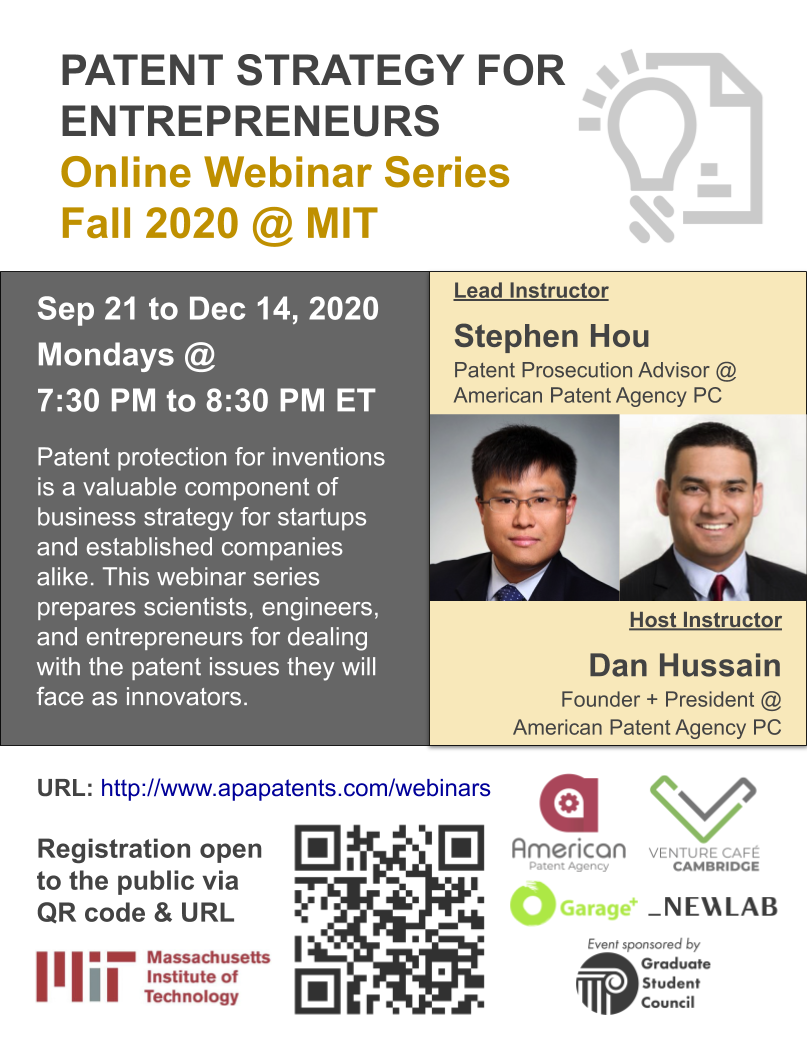
Patent Strategy for Entrepreneurs: Fall 2020 Webinar Series @ MIT
Patent protection is an essential element of business strategy for both startups and established companies. This webinar series equips scientists, engineers, and entrepreneurs with the knowledge and tools needed to address the patent-related challenges they will encounter as innovators. The series covers a wide range of topics in patent law, including claims, inventorship, patentability requirements, the patent application process, prosecution, post-grant proceedings, litigation, and licensing. While the primary focus is on U.S. law, some topics will also include insights from other jurisdictions. We will discuss the implications of recent developments in patent law for inventors, drawing on examples from industries such as computer software and pharmaceuticals.
- Hosted by MIT Graduate Student Council
- Start: Monday, September 21, 2020 7:30 PM EDT / 04:30 PM PDT
- End: Monday, December 14, 2020 8:30 PM EST / 05:30 PM PST
- Recording passcode: MIT-2020
Date
Monday, September 21, 2020 7:30 PM EDT / 04:30 PM PDT
Topic
General Introduction to Patents
Description
Startups often ask why they should patent their innovations and how they should start learning about patent laws and procedures. This session will discuss the rationale behind patents, compare them to trade secrets, and outline the legal framework that governs patents. Additionally, an overview of the series’ topics will be provided.
Goals:
- Understand what patents are and how they differ from trade secrets.
- Gain insight into the legal framework governing patents.
- Explore a roadmap of the topics covered in the series.
Recording
Monday, September 28, 2020 7:30 PM EDT / 04:30 PM PDT
Claims, Inventorship, Ownership & Patent Rights
Startups often struggle to understand patent claim language and navigate complex inventorship and ownership issues related to their patents. This session will explain how patent claims work, the legal aspects of inventorship and ownership, and the scope of patent rights.
Goals:
- Learn to read a patent claim and understand its scope.
- Identify the factors that determine co-inventorship and co-ownership of a patent.
- Prevent or address potential disputes related to inventorship and ownership of patents.
Monday, October 5, 2020 7:30 PM EDT / 04:30 PM PDT
Patentability Requirements I: 101 (Subject Matter Eligibility) & 112 (Sufficiency of Disclosure)
Startups often ask whether their technology qualifies for patent protection and, if so, how much they must disclose in their patent application. This session will cover the patentability requirements outlined in 35 USC 101 (patentable subject matter) and 35 USC 112 (sufficiency of disclosure).
Goals:
- Identify categories of inventions that are excluded from patent protection.
- Develop strategies for defining claim scope to address issues with abstract ideas, laws of nature, or natural phenomena.
- Determine how much to disclose in a patent application.
Monday, October 19, 2020 7:30 PM EDT / 04:30 PM PDT
Patentability Requirements II: 102 (Novelty)
Startups often ask how innovative their invention must be to qualify for patent protection and when the right time is in their R&D cycle to file a patent application. This session will cover the patentability requirements under 35 USC 102 (novelty).
Goals:
- Identify potential prior art events that could disqualify an invention from patent protection.
- Understand the steps inventors must take to maintain the novelty of their invention.
- Determine the ideal timeframe for applying for patents.
Monday, October 26, 2020 7:30 PM EDT / 04:30 PM PDT
Patentability Requirements III: 103 (Non-Obviousness)
Startups often ask how non-obvious their invention must be to qualify for patent protection. This session will cover the patentability requirements under 35 USC 103 (non-obviousness).
Goals:
- Understand and apply the standards used by the patent office and federal courts to assess the non-obviousness of inventions.
- Develop strategies for overcoming claim rejections based on obviousness.
Monday, November 2, 2020 7:30 PM EST / 04:30 PM PST
Application Process & Prosecution I
Startups often ask how the patent application process works and how to handle rejections. This session will cover the U.S. patent application process and how to navigate patent prosecution.
Goals:
- Understand the patent application process.
- Recognize and adhere to the ethical responsibilities associated with being an inventor or applicant.
Monday, November 16, 2020 7:30 PM EST / 04:30 PM PST
Application Process & Prosecution II
Startups often ask about other inventors’ experiences with the patent office. This session will review case studies of various U.S. patent applications undergoing examination and prosecution.
Goals:
- Learn from the experiences of other inventors.
- Understand the strategies involved in patent prosecution
Monday, November 23, 2020 7:30 PM EST / 04:30 PM PST
Post-Grant Proceedings
Startups often ask how the validity of their patents may be challenged by others. This session will cover the procedures for challenging patent validity through post-grant proceedings at the U.S. Patent and Trademark Office.
Goals:
- Understand the different avenues through which a patent’s validity can be challenged.
- Evaluate the pros and cons of each of these avenues.
Monday, December 7, 2020 7:30 PM EST / 04:30 PM PST
Litigation
Startups often ask how the validity of their patents can be challenged by others and how they can enforce their patents against alleged infringers. This session will explore these procedures in U.S. federal courts (litigation) and discuss the elements that constitute patent infringement. We’ll also cover defenses and remedies for patent infringement.
Goals:
- Understand the strategy involved in patent litigation.
- Develop strategies for crafting a strong patent application with potential future litigation in mind.
Monday, December 14, 2020 7:30 PM EST / 04:30 PM PST
Licensing & Business Considerations
Startups often ask how they can generate revenue from their patents. This session will cover the laws governing patent licensing deals and the relationship between patent portfolios and company valuation.
Goals:
- Identify the key factors in negotiating a favorable patent licensing deal.
- Understand the value patents add to a business, making it more attractive to investors.
Patent Law Essentials: What Scientists, Engineers & Entrepreneurs Need to Know
Patent protection is a vital component of business strategy for both startups and established companies. This webinar offers an overview of how patents work and covers the fundamentals of U.S. patent law, including inventorship, patentability, the patent application process, prosecution, litigation, and licensing. We will also explore recent developments in patent law and discuss their implications for inventors, with examples drawn from industries ranging from computer software to pharmaceuticals.
- Hosted by MIT Chinese Entrepreneurs Energy Community & Battery Bridge
- Start: Thursday, August 20, 2020 6:00 PM EDT / 03:00 PM PDT
- End: Thursday, August 20, 2020 8:00 PM EDT / 05:00 PM PDT
Patent Strategy for Entrepreneurs: Claims, Inventorship, Ownership & Patent Rights
Startups often struggle with understanding patent claim language and resolving complex inventorship and ownership issues related to their patents. This session will explore how patent claims work, the laws surrounding inventorship and ownership, and the scope of patent rights.
By the end of this webinar, you should be able to:
- Read a patent claim and understand its scope.
- Identify the factors that determine co-inventorship and co-ownership of a patent.
- Prevent or address potential disputes related to inventorship or ownership.
- Hosted by Venture Cafe Cambridge
- Start: Thursday, August 13, 2020 5:00 PM EDT / 02:00 PM PDT
- End: Thursday, August 13, 2020 6:00 PM EDT / 03:00 PM PDT
Patent Law Essentials: What Scientists, Engineers & Entrepreneurs Need to Know
Patent protection is an essential component of business strategy for both startups and established companies. This webinar will provide an overview of how patents work and cover the fundamentals of U.S. patent law, including inventorship, patentability, the patent application process, prosecution, litigation, and licensing. We will also discuss recent developments in patent law and examine their implications for inventors, with examples from a range of industries, including computer software and pharmaceuticals.
- Hosted by MIT Chinese Entrepreneurs
- Start: Wednesday, July 15, 2020 7:00 PM EDT / 04:00 PM PDT
- End: Wednesday, July 15, 2020 9:00 PM EDT / 06:00 PM PDT
Patent Strategy for Entrepreneurs: The Application Process & Prosecution
Startups often ask how the patent application process works and how to handle rejections. In this seminar, we will explore the U.S. patent application process and discuss strategies for prosecuting applications.
- Hosted by Venture Cafe Cambridge
- Start: Thursday, July 9, 2020 3:00 PM EDT / 12:00 PM PDT
- End: Thursday, July 9, 2020 4:00 PM EDT / 01:00 PM PDT
Patent Strategy for Entrepreneurs: Post-Grant Proceedings, Litigation & Licensing
Startups often ask how the validity of their patents can be challenged by others, how they can enforce their patents against alleged infringers, and how they can generate revenue from their patents. In this webinar, we will discuss post-grant proceedings at the U.S. Patent & Trademark Office, patent litigation in federal courts, and the laws governing patent licensing deals.
- Hosted by Newlab
- Start: Wednesday, July 1, 2020 12:00 PM EDT / 09:00 AM PDT
- End: Wednesday, July 1, 2020 1:00 PM EDT / 10:00 AM PDT
- Recording passcode: Newlab
Patent Strategy for Entrepreneurs: What is Patentable? What Must I Disclose and When?
Startups often ask whether their technology qualifies for patent protection, when the right time is in their R&D cycle to apply for patents, and how much they should disclose in their applications. In this seminar, we will discuss the key patentability requirements, including patentable subject matter, novelty, non-obviousness, and sufficiency of disclosure.
- Hosted by Taiwanese American Professionals
- Start: Wednesday, June 24, 2020 8:00 PM EDT / 05:00 PM PDT
- End: Wednesday, June 24, 2020 9:30 PM EDT / 06:30 PM PDT
- Recording passcode: TAP#2020
Patent Law Essentials: What Scientists, Engineers & Entrepreneurs Need to Know
Patent protection is a valuable component of business strategy for both startups and established companies. This webinar provides an overview of how patents work and covers the basics of U.S. patent law, including inventorship, patentability, the patent application process, prosecution, litigation, and licensing. We will also discuss recent developments in patent law and examine their implications for inventors, with examples drawn from industries ranging from computer software to pharmaceuticals.
- Hosted by MIT Club of Princeton
- Start: Tuesday, June 16, 2020 7:00 PM EDT / 04:00 PM PDT
- End: Tuesday, June 16, 2020 8:00 PM EDT / 05:00 PM PDT
- Recording passcode: MIT2020!
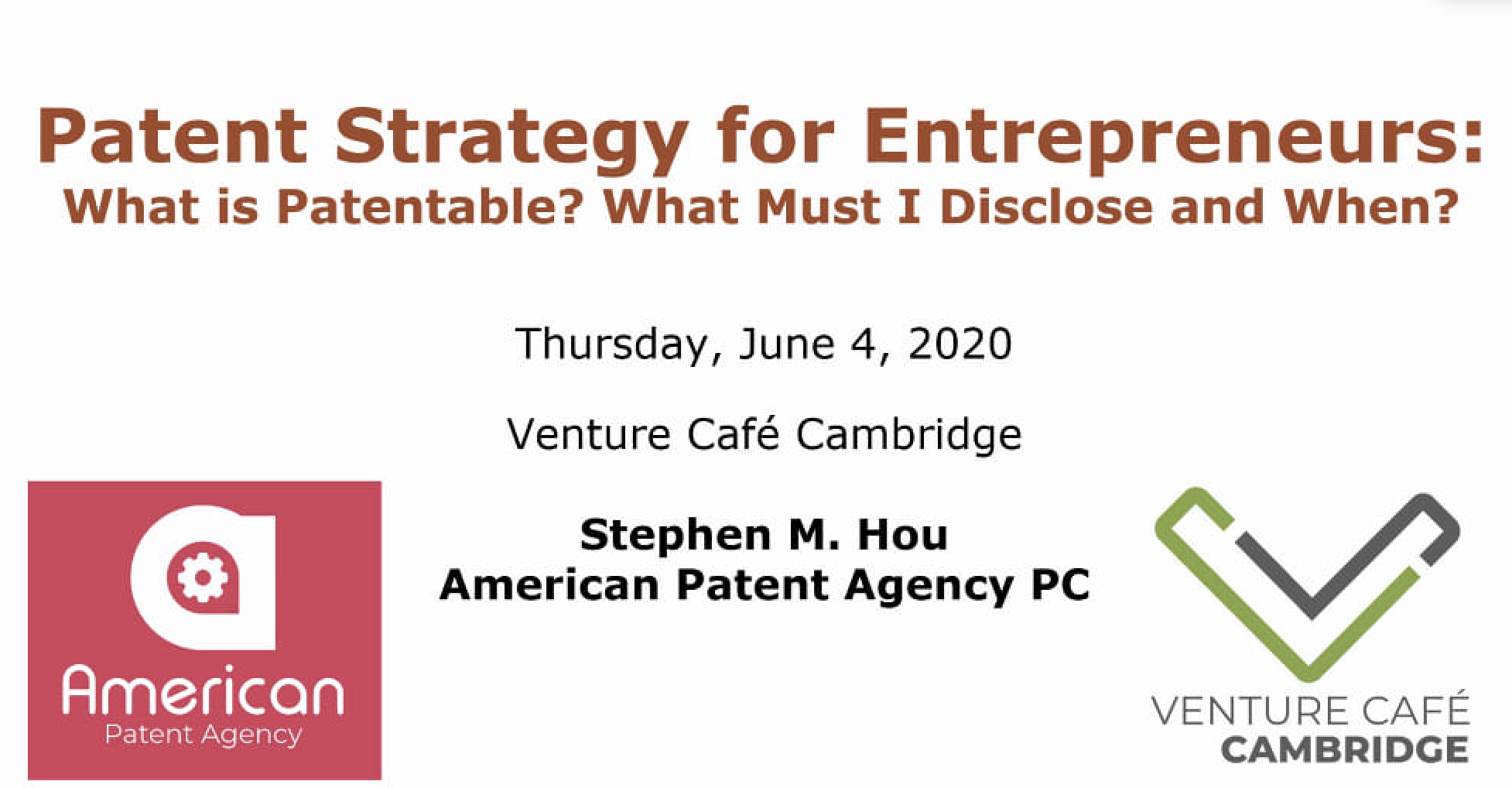
Patent Strategies for Entrepreneurs: What is Patentable? What Must I Disclose and When?
Startups often wonder whether their technology qualifies for patent protection, when the right time is in their R&D cycle to apply for patents, and how much to disclose in their applications. In this seminar, we will discuss the key patentability requirements, including patentable subject matter, novelty, non-obviousness, and sufficiency of disclosure.
- Hosted by Venture Cafe Cambridge
- Start: Thursday, June 4, 2020 5:00 PM EDT / 02:00 PM PDT
- End: Thursday, June 4, 2020 6:00 PM EDT / 03:00 PM PDT
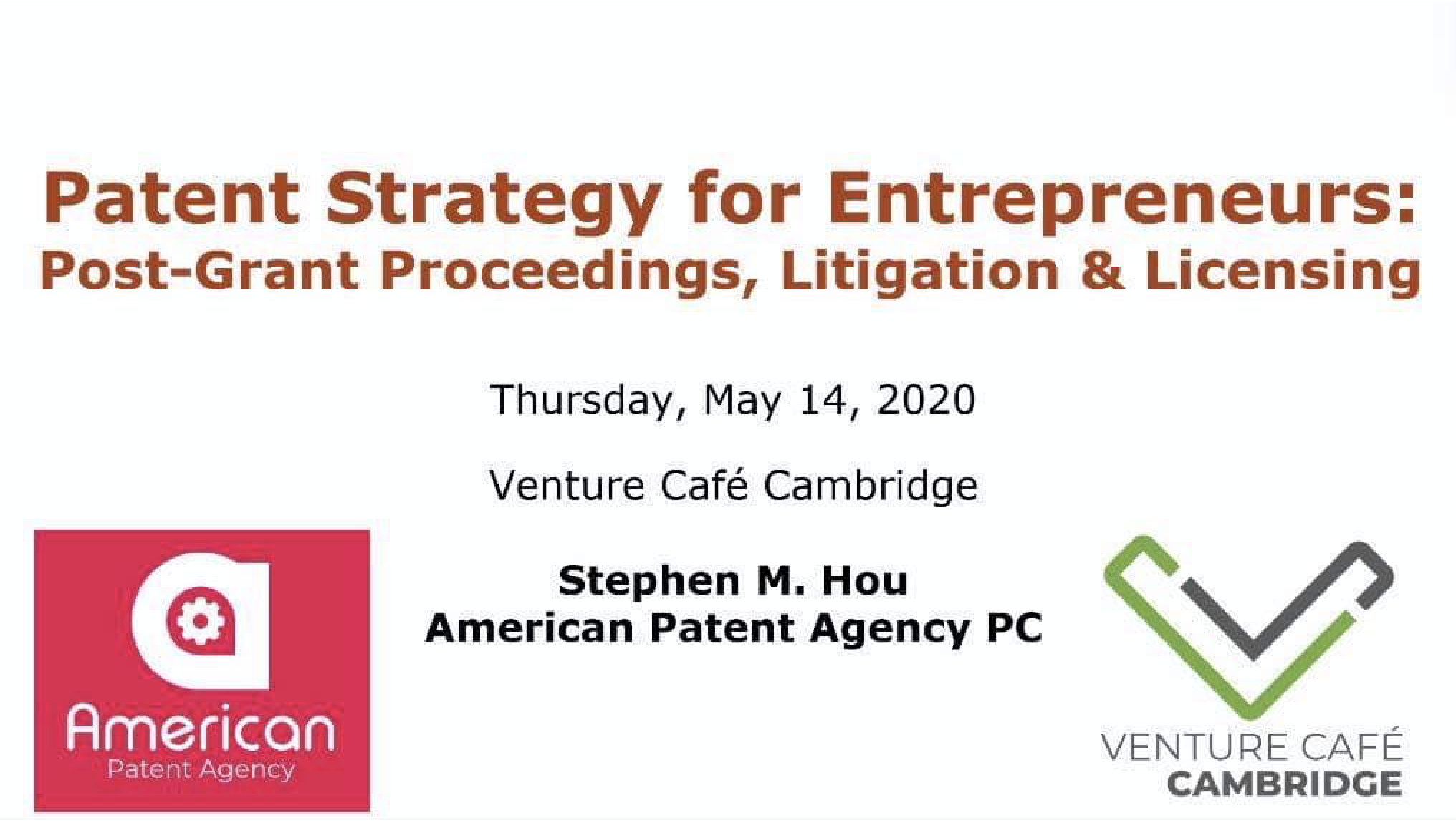
Patent Strategies for Entrepreneurs: Post-Grant Proceedings, Litigation & Licensing
Startups often ask how the validity of their patents may be challenged by others, how they can enforce their patents against alleged infringers, and how they can generate revenue from their patents. In this seminar, we will discuss these procedures as they work in the U.S. Patent & Trademark Office (post-grant proceedings), in federal courts (litigation), and the laws governing patent licensing deals.
- Hosted by Venture Cafe Cambridge
- Start: Thursday, May 14, 2020 5:00 PM EDT / 02:00 PM PDT
- End: Thursday, May 14, 2020 6:00 PM EDT / 03:00 PM PDT
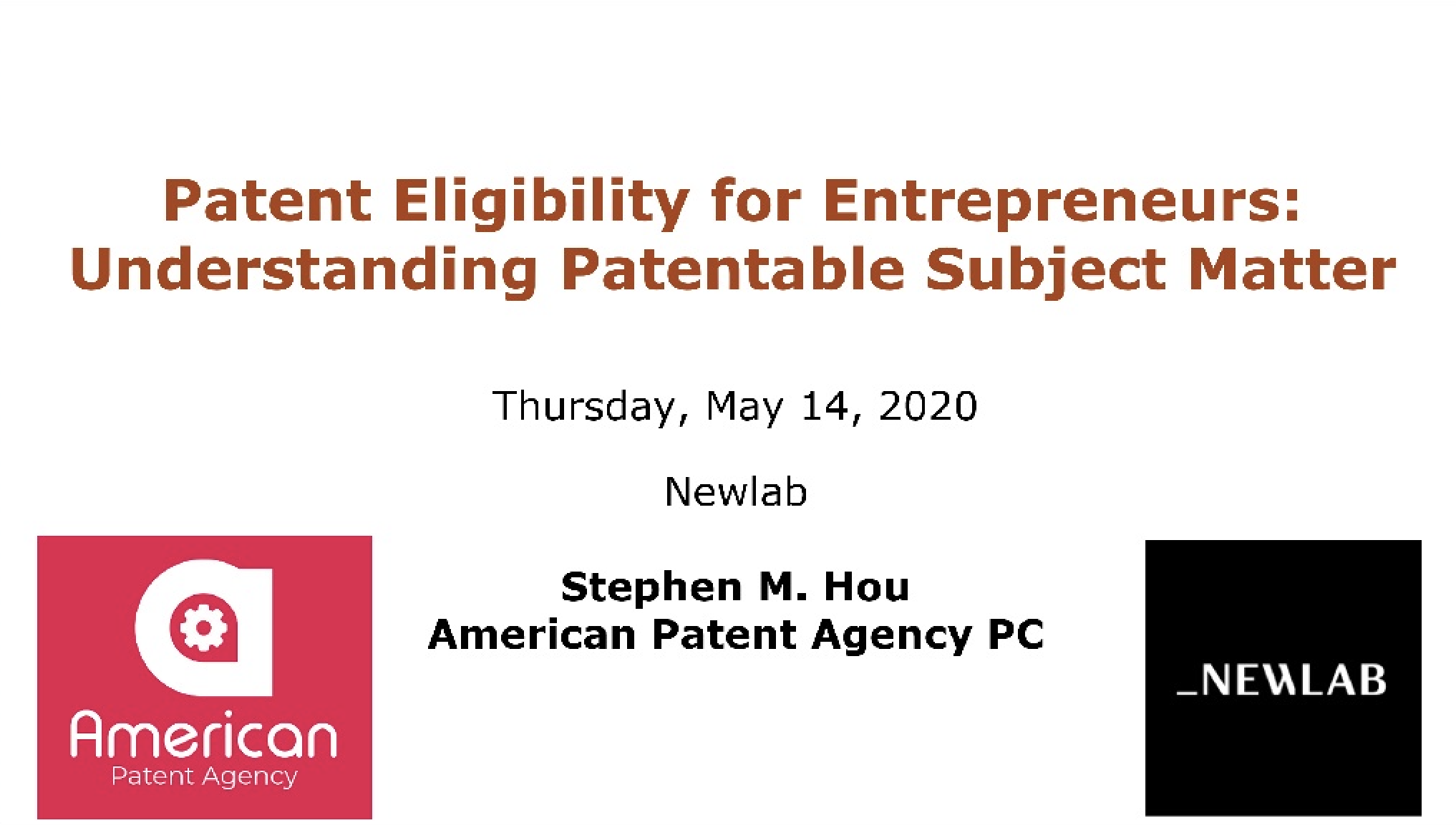
Patent Eligibility for Entrepreneurs: Understanding Patentable Subject Matter
Startups often face uncertainty about which technologies qualify for patent protection, particularly in the realms of software and life sciences. In this session, American Patent Agency PC—an MIT-trained team focused on drafting, filing, and prosecuting U.S. patents for tech startups—will discuss important factors to consider when applying for patents and share recent developments regarding patent eligibility in these specific fields.
- Hosted by Newlab
- Start: Thursday, May 14, 2020 12:00 PM EDT / 09:00 AM PDT
- End: Thursday, May 14, 2020 1:00 PM EDT / 10:00 AM PDT
